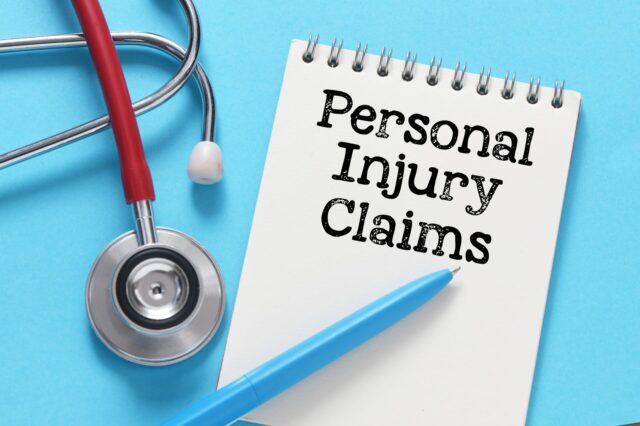Houston Personal Injury Lawyer / Blog / How Long After an Accident Can You Claim Injury?
November 17, 2024 | By AP Law Group
How Long After an Accident Can You Claim Injury?
When it comes to car accidents, time can be your biggest ally or your worst enemy. In Texas, the law allows a limited window—typically two years—to file an injury claim after an accident. However, injuries aren’t always immediately apparent. Whiplash, brain injuries, and other trauma may take weeks or even months to reveal their true severity, making the clock on your legal rights tick faster than you might realize.
This guide will cover everything you need to know about Texas's specific statutes of limitations for accident-related injury claims, exceptions that could extend your filing time, and what steps to take to protect your right to fair compensation. We know from experience how the aftermath of an accident can be a time of physical, emotional, and financial turmoil; however, acting with clarity and timeliness will help ensure you aren’t left without recourse.
If you or a loved one has been in an accident, don’t wait to understand your options. Contact our firm today at (713) 913-4627 to discuss your case, evaluate your timeline, and secure your path to recovery. Our Houston car accident lawyers are here to advocate for your right to compensation.
Free Case Evaluation
What is the Statute of Limitations for Personal Injury Claims in Texas?
 Under Texas law, most personal injury claims—including those arising from car accidents, falls, and other incidents involving negligence—must be filed within two years of the date of the injury. This timeframe, set by Texas Civil Practice and Remedies Code § 16.003, is known as the statute of limitations, and it operates as a strict deadline. If you miss this window, you generally forfeit your right to pursue compensation through the court system.
Under Texas law, most personal injury claims—including those arising from car accidents, falls, and other incidents involving negligence—must be filed within two years of the date of the injury. This timeframe, set by Texas Civil Practice and Remedies Code § 16.003, is known as the statute of limitations, and it operates as a strict deadline. If you miss this window, you generally forfeit your right to pursue compensation through the court system.
Why the Two-Year Rule Matters
This two-year rule serves several purposes:
- Preservation of Evidence: Memories fade, and evidence can be lost or degraded over time. Acting promptly helps ensure that your claim has the strongest support possible.
- Legal Protection: Statutes of limitations protect defendants from facing claims long after an incident, when the facts are harder to verify. By filing within two years, you help preserve the integrity of your case.
- Closure for Both Parties: Moving quickly allows for a more timely resolution, which benefits both the injured party and the alleged at-fault party.
Common Personal Injury Scenarios That Follow the Two-Year Rule
Most personal injury claims in Texas must adhere to this two-year timeframe, including:
- Car and Motorcycle Accidents: Injuries resulting from vehicle collisions, whether they involve cars, motorcycles, or other road users.
- Truck Accidents: Cases involving commercial trucks, which often involve severe injuries and may require expert investigation into fault and damages.
- Premises Liability (Slip and Fall): Accidents on another person’s property, such as slipping on a wet floor in a store or falling on an icy walkway.
- Wrongful Death Claims: For cases involving a death caused by negligence, the two-year period begins from the date of death, not necessarily the date of the incident.
Filing on Time: Protecting Your Rights
Failing to meet the statute of limitations will almost always bar you from pursuing legal action in Texas. However, a timely filing does much more than just protect your right to sue. Early action:
- Secures Evidence and Witnesses: As time passes, evidence can be lost, and witnesses may become harder to locate. By filing promptly, you ensure key facts remain fresh and accessible.
- Strengthens Your Negotiation Power: Insurance companies are aware of the statute of limitations and may attempt to delay settlements. When you file within the allowable period, you retain the upper hand in negotiations and avoid unnecessary setbacks.
Exceptions to the Statute of Limitations in Texas
While Texas law typically requires accident victims to file a personal injury claim within two years, there are key exceptions that can extend or pause this timeframe. These exceptions are designed to account for cases where it may be difficult or even impossible to file within the standard period.
One of the most common exceptions to the statute of limitations is the discovery rule. In cases where injuries are not immediately detectable—such as internal injuries, traumatic brain injuries, or latent medical complications—the two-year clock may start ticking from the date you discovered, or reasonably should have discovered, the injury rather than the date of the accident itself.
This rule, designed to protect those who unknowingly suffer delayed symptoms, can help ensure you aren’t unfairly penalized for circumstances beyond your control.
- Example: If a car accident results in mild symptoms that escalate into a serious brain injury weeks after the incident, the two-year period may begin from the date of diagnosis, rather than the accident itself.
Minors and Incapacitated Individuals: Extending the Deadline
When an accident victim is under 18 or legally incapacitated at the time of the injury, Texas law pauses—or “tolls”—the statute of limitations until the individual is capable of filing a claim. For minors, the statute of limitations begins on their 18th birthday, giving them until they turn 20 to file a lawsuit. This tolling also applies to those with mental incapacities that prevent them from making legal decisions at the time of the accident.
Government Entities: Special Rules and Shorter Deadlines
 If your accident involves a government entity—such as a city-owned vehicle or a public facility—filing deadlines are often much shorter and involve specific notice requirements. Texas law generally requires you to give written notice of your claim to the appropriate government agency within six months of the accident. However, some cities impose even stricter time limits, requiring notice within as few as 30 days. Failing to meet these requirements will typically bar you from bringing a claim against the government entity, so prompt action is essential.
If your accident involves a government entity—such as a city-owned vehicle or a public facility—filing deadlines are often much shorter and involve specific notice requirements. Texas law generally requires you to give written notice of your claim to the appropriate government agency within six months of the accident. However, some cities impose even stricter time limits, requiring notice within as few as 30 days. Failing to meet these requirements will typically bar you from bringing a claim against the government entity, so prompt action is essential.
- Example: A pedestrian hit by a city bus in Houston would need to notify the city of their intention to pursue a claim within Houston’s specific timeframe (90 days), or risk losing the ability to file a lawsuit.
Tolling of the Statute of Limitations: Unique Circumstances
Under certain rare circumstances, Texas law allows the statute of limitations to be temporarily suspended, or "tolled," which pauses the clock on your filing deadline. Common reasons for tolling include:
- Legal Disability: In cases where the injured party is incapacitated, the statute is paused until they regain capacity.
- Fraudulent Concealment: If an at-fault party actively hides information about the injury or damages, the statute may be tolled until the deception is discovered.
- Tolling Agreements: In some cases, both parties may agree to suspend the statute of limitations, often to allow for negotiations or other legal procedures.
How Delayed Injury Symptoms Affect Filing Deadlines
In many accident cases, injuries may not present themselves right away. It’s not uncommon for accident victims to experience pain or symptoms days or even weeks after the incident, leading to what’s known as delayed-onset injuries. This is especially true for conditions like whiplash, concussions, and internal injuries, which may not be immediately detectable but can have serious, long-term effects on one’s health.
In Texas, the standard two-year statute of limitations can, in some cases, accommodate these delayed symptoms through the discovery rule—a legal principle that allows the clock to start ticking from the date you discovered, or reasonably should have discovered, the injury.
Common Delayed-Onset Injuries and Their Legal Implications
- Traumatic Brain Injuries (TBIs): Brain injuries can be subtle at first but can lead to severe cognitive or physical impairment over time.
- Whiplash and Soft Tissue Injuries: These injuries often take days to reveal full symptoms, affecting your neck, back, and range of motion.
- Internal Injuries: Internal bleeding or organ damage can go unnoticed initially, posing serious health risks if left untreated.
For cases like these, the discovery rule may extend the deadline, giving you time to file a claim once the injury becomes apparent. However, the rule applies only if the injury could not have been reasonably detected right after the accident. Medical records, diagnoses, and expert testimony can prove that the injury’s symptoms were delayed, rather than missed due to inaction.
Why Prompt Medical Attention Is Crucial
Seeking immediate medical care after an accident—even if you feel fine at the moment—is one of the best ways to protect your legal rights. Medical evaluations not only help identify potential delayed-onset injuries but also serve as documentation if you need to demonstrate that symptoms appeared after the accident. This documentation:
- Strengthens Your Claim: A medical record showing a timely visit and diagnosis helps establish a clear link between the accident and your injury.
- Clarifies Injury Timeline: Medical documentation can support a delayed discovery claim by showing when the injury became detectable.
- Provides Evidence for the Discovery Rule: If you need to argue that your claim should be extended, this record can serve as evidence that your injuries were indeed not immediately apparent.
Acting Quickly Once Symptoms Appear
If you notice symptoms after the accident, don’t hesitate to consult a physician and seek legal guidance immediately. The two-year period may still be in effect if your symptoms appeared within a reasonable timeframe following the accident. Taking prompt action helps protect your claim and ensures that you don’t lose out on the compensation you deserve.
Consequences of Missing the Statute of Limitations
In Texas, missing the two-year statute of limitations for a personal injury claim has serious and often irreversible consequences.
What Happens When You Miss the Deadline?
The primary consequence of missing the filing deadline is that the court will likely dismiss your claim. This dismissal:
- Ends Your Right to Legal Recourse: Without an active claim, you cannot pursue damages, even if your injuries are severe or the at-fault party’s negligence is clear.
- Nullifies Settlement Negotiations: Insurance companies are aware of Texas’s statute of limitations and will refuse to negotiate if they know your legal claim is no longer valid.
- Leaves You with Financial Responsibility: Without the ability to pursue a claim, you’re responsible for all medical expenses, lost wages, and other costs associated with your injury.
Risks of Self-Negotiation with Insurance Companies
Attempting to handle the case alone or negotiating directly with insurance companies poses risks if you’re nearing the statute of limitations. Insurance adjusters are skilled at delaying the process, and by the time negotiations fall through, it may be too late to file a lawsuit. By involving a legal team early, you avoid this pitfall and secure leverage in the claims process.
Why Legal Guidance Is Key to Meeting Deadlines
Working with an experienced personal injury attorney helps prevent missed deadlines and costly mistakes. A law firm will:
- Monitor All Relevant Deadlines: From initial claim notices to filing timelines, a dedicated legal team ensures you stay within all required timeframes.
- Document Evidence Effectively: Attorneys can collect and organize essential documentation that supports your case and any applicable exceptions to the statute.
- Strengthen Your Claim for Compensation: With legal support, you’re better positioned to obtain compensation for all accident-related expenses and hardships.
Protect Your Right to Compensation with AP Law Group
Every day you wait to file a claim puts your right to compensation at greater risk. Texas law is firm on deadlines, and missing them could mean facing the full financial burden of an accident alone. Don’t let delays, missing evidence, or overlooked injuries jeopardize the justice and compensation you deserve.
Let us stand by your side through this process. Contact AP Law Group today at (713) 913-4627 to secure your case consult with our Houston personal injury lawyer today and set your path toward recovery.
Free Case Evaluation
 Under Texas law, most personal injury claims—including those arising from car accidents, falls, and other incidents involving negligence—must be filed within two years of the date of the injury. This timeframe, set by Texas Civil Practice and Remedies Code § 16.003, is known as the statute of limitations, and it operates as a strict deadline. If you miss this window, you generally forfeit your right to pursue compensation through the court system.
Under Texas law, most personal injury claims—including those arising from car accidents, falls, and other incidents involving negligence—must be filed within two years of the date of the injury. This timeframe, set by Texas Civil Practice and Remedies Code § 16.003, is known as the statute of limitations, and it operates as a strict deadline. If you miss this window, you generally forfeit your right to pursue compensation through the court system.
 If your accident involves a government entity—such as a city-owned vehicle or a public facility—filing deadlines are often much shorter and involve specific notice requirements. Texas law generally requires you to give written notice of your claim to the appropriate government agency within six months of the accident. However, some cities impose even stricter time limits, requiring notice within as few as 30 days. Failing to meet these requirements will typically bar you from bringing a claim against the government entity, so prompt action is essential.
If your accident involves a government entity—such as a city-owned vehicle or a public facility—filing deadlines are often much shorter and involve specific notice requirements. Texas law generally requires you to give written notice of your claim to the appropriate government agency within six months of the accident. However, some cities impose even stricter time limits, requiring notice within as few as 30 days. Failing to meet these requirements will typically bar you from bringing a claim against the government entity, so prompt action is essential.
